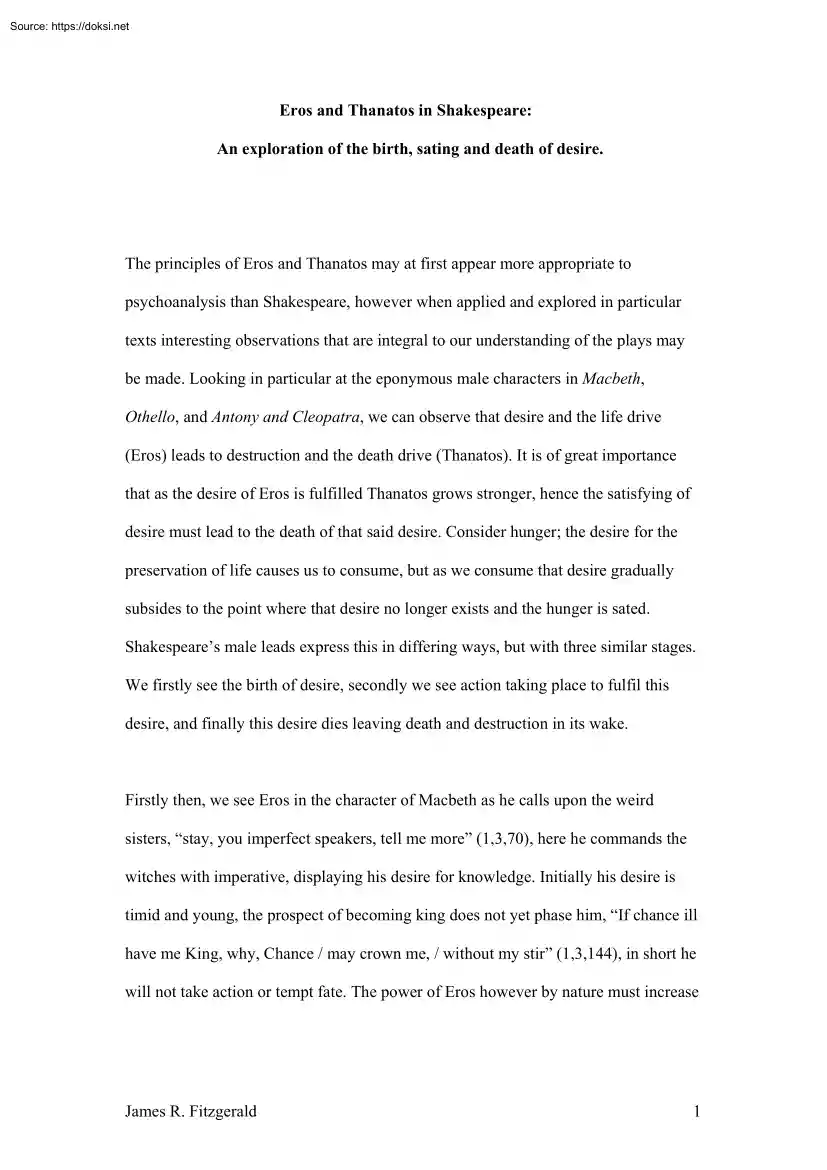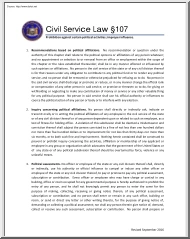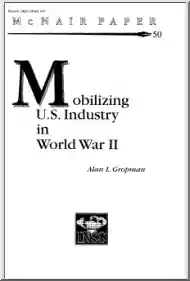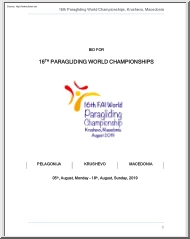Comments
No comments yet. You can be the first!
What did others read after this?
Content extract
Eros and Thanatos in Shakespeare: An exploration of the birth, sating and death of desire. The principles of Eros and Thanatos may at first appear more appropriate to psychoanalysis than Shakespeare, however when applied and explored in particular texts interesting observations that are integral to our understanding of the plays may be made. Looking in particular at the eponymous male characters in Macbeth, Othello, and Antony and Cleopatra, we can observe that desire and the life drive (Eros) leads to destruction and the death drive (Thanatos). It is of great importance that as the desire of Eros is fulfilled Thanatos grows stronger, hence the satisfying of desire must lead to the death of that said desire. Consider hunger; the desire for the preservation of life causes us to consume, but as we consume that desire gradually subsides to the point where that desire no longer exists and the hunger is sated. Shakespeare’s male leads express this in differing ways, but with three
similar stages. We firstly see the birth of desire, secondly we see action taking place to fulfil this desire, and finally this desire dies leaving death and destruction in its wake. Firstly then, we see Eros in the character of Macbeth as he calls upon the weird sisters, “stay, you imperfect speakers, tell me more” (1,3,70), here he commands the witches with imperative, displaying his desire for knowledge. Initially his desire is timid and young, the prospect of becoming king does not yet phase him, “If chance ill have me King, why, Chance / may crown me, / without my stir” (1,3,144), in short he will not take action or tempt fate. The power of Eros however by nature must increase James R. Fitzgerald 1 and grow stronger in order for the eventual satisfaction of desire and Macbeth hints at the inner movings of his mind: Stars, hide your fires; Let not light see my black and deep desires: The eye wink at the hand; yet let that be, Which the eye fears, when it is done, to
see. (1,4,50-53) We see even at these early stages of the play that desire and ambition are beginning to develop and it is interesting when this is viewed as Eros as it precursors Macbeth’s eventual downfall through the antithesis, Thanatos. Othello also harbours a desire, although his is realised in a different time scale and a different manner to Macbeth’s. As the play opens Othello already has some rooted or previous desires, his desire for Desdemona culminated in his marriage to her and his desire for military superiority has led him to become a great general. However, the key desire that results in the deaths of the main characters in the final act of Othello is his desire for knowledge and truth. Othello, somewhat prophetically and ironically, utters “My life upon her Faith. Honest Iago” (1,3,295) His trust is only well placed in the first of these clauses and even so it is his lack of faith, not Desdemona’s lack of faithfulness, that lead to his destruction. As with
Macbeth then the craving for knowledge is already present in Othello, however it takes Iago to push this stone so that Eros may begin rolling uncontrollably towards Thanatos. Iago hints at the possibility of Desdemona being unchaste and Othello’s fearful desire for information is unveiled in his repeated questioning, “What dost thou say, Iago” (3,3,93) “Why of James R. Fitzgerald 2 thy thought, Iago?” (3,3,98). Ultimately Othello begs to know the truth regardless of the pain it may bring him: Nay, yet there's more in this: I prithee, speak to me as to thy thinkings, As thou dost ruminate, and give thy worst of thoughts The worst of words. (3,3,133-136) What Othello fails to see however, is that the gradual sating of his desire is ensued by Thanatos and thus will his life inevitably end in tragedy. Antony too is subject to Eros and Thanatos, his desire however lies not in his title as is the case with Macbeth, nor is he alike Othello in pursuing truth, instead
his desire lies chiefly in the empire, and secondly in his decadent relationship with Cleopatra. It is apparent from the first act that his ambition for the Roman empire supersedes his relationship with Cleopatra: The strong necessity of time commands Our services awhile, but my full heart Remains in use with you. Our italy Shines o’er with civil swords (1,3,43-45) Indeed his marriage to Octavia is born out of a purely ambitious motive, the uniting of himself and Caesar, even so, he still puts his military responsibilities first, “The world, and my great office, will sometimes / Divide me from your bosom” (2,3,1-2). James R. Fitzgerald 3 His desire becomes stronger and we see in his confrontation of the soothsayer that Eros begins to develop, “say to me, whose fortunes shall rise higher, / Caesar’s or mine?” (2,3,15), thus questioning in a similar way to both Macbeth and Othello. It is interesting that all three characters have initial desires which are enlarged by
some outside influence, and that the result for all three is to question. Macbeth is influenced by the witches and then pushed further by his wife, Othello is goaded by Iago, and Antony too is propelled into desire by Cleopatra and Caesar. At this point all three male characters are in states of desire or ambition, and the natural progression here is to then attempt to satisfy these desires. Eros has taken hold of all three characters and it is notable that now in each case a course of action must be undertaken in order to obtain the objects of these desires. Macbeth resolves to follow Lady Macbeth’s plan and although in great distress, none the less he draws ever closer to obtaining his title as King: I am settled, and bend up Each corporal agent to this terrible feat. Away, and mock the time with fairest show: False face must hide what the false heart doth know. (1,7, 80-83) It is important to observe that Macbeth already shows signs of instability because of Eros and his
soliloquy before Duncan’s murder can be seen as metaphoric. The dagger he gropes for is an extension of the object of his desire and this, appropriately enough, is a death symbol therefore signifying Thanatos: James R. Fitzgerald 4 Is this a dagger which I see before me, The handle toward my hand? Come, let me clutch thee. I have thee not, and yet I see thee still. (2,1 33-34) This resonates of his future death, he has death not, yet we can still see through Eros and Thanatos the prospect of his eventual demise. Duncan’s murder should see the satisfaction of his desire but as suspicion is rife Macbeth is led to paranoia and takes further action killing Banquo and Macduff’s family. Macbeth must dissipate the sense of guilt and lack of purpose Duncan’s murder brings and he thus struggles to sustain Eros and prolong Thanatos through committing further murders. This leads him to once again consult the three witches “to the weird sisters: / More shall they speak; for now I
am bent to know” (3,4,132-133). We see then that as desire slowly weakens Thantos becomes more powerful and Macbeth struggles to sustain a balance between the two. Othello too must deal with this shift in balance, once obtaining the first drip of false knowledge that Desdemona has been unfaithful from Iago he begins to lament this revelation, “I aw’t not, thought it not, it harmed not me” (3,3,342). Like Macbeth Eros threatens to turn to Thanatos and Othello takes action to prolong the change and maintain balance between the two demanding, “Give me the ocular proof” (3,3,363) and then stating, “I’ll have some proof” (3,3,389). The fatal turning point that leads to further action occurs when Othello tests his wife, asking for the infamous handkerchief, “Fetch me the handkerchief, my mind misgives” (3,4,91). As he realises she cannot provide him the answer he desires, he is forced to believe Iago James R. Fitzgerald 5 further, constantly repeating the
exclamation, “The Handkerchief!” as Desdemona flusters around him trying to placate his anger and disbelief. The action that follows this is Othello’s confrontation of Dedemona, “Heaven truly knows that thou art false as hell” (4,2,40). This image of antitheses demonstrates how Eros has started to erode Othello and affect both his mental state and his judgement in his relationships. He now fully trusts Iago and totally distrusts Desdemona therefore heralding his tragic end in the final act. If Macbeth and Othello then struggle in the balance of Eros and Thanatos, Antony lies in a similar plateau. Caesar’s betrayal of the triumvirate is vital to Antony aligning himself with Egypt, and thus he sends Octavia back and flees to Cleopatra. He has forewarned of this in act two stating, “I' the east my pleasure lies” (2,3,38-39), and now crosses the rubicon to declare war against Caesar. His desire for military superiority and Cleopatra are married in the first naval
battle, “I’ll fight at sea” (3,7,48). Antony’s hamartia is the manifestation of pride and desire that leads him to fight a type of battle he has little experience or resources in. We here see Antony’s resolve challenged as he loses the first naval battle: Hark! the land bids me tread no more upon't; It is ashamed to bear me! Friends, come hither: I am so lated in the world, that I Have lost my way for ever (3,11,1-4) This regret is an indication of the approach of Thanatos as regret indicates the dying of desire. He grapples with his emotions and holds off Thanatos a short while longer James R. Fitzgerald 6 as he prepares for further battles reassuring himself “we will yet do well” (3,13,192). Therefore his desire has awakened the process of Thanatos and as Eros is gradually fulfilled he unwittingly prepares not only to bring himself, but an entire nation down with him. If we have then tracked the rising and shift in balance of Eros, the final exploration is
that of the domination of Thanatos over Eros, thus harbinging death and tragedy in the conclusions of these plays. In Macbeth early on we see traces of regret as Macbeth despairs, “Macbeth shall sleep no more!” (2,2,42), and shortly after, “I am afraid to think what I have done; / Look on’t again I dare not” (2,2,5051). The realisation of Thanatos has been delayed through acts three and four but now in act five is both apparent and inevitable: The way to dusty death. Out, out, brief candle! Life's but a walking shadow, a poor player That struts and frets his hour upon the stage And then is heard no more: it is a tale Told by an idiot, full of sound and fury, Signifying nothing. (5,5,23-28) Macbeth’s cynicism comes from the acknowledgement that his efforts have been foolish and that his desire, now sated, was misplaced. Macbeth is defiant to the last, fully aware that the drive towards death is fully upon him he still resists: Why should I play the Roman fool, and
die James R. Fitzgerald 7 On mine own sword? whiles I see lives, the gashes Do better upon them. (5,8,1-2) Macbeth does of course die by the hand of Macduff and the cycle of Eros and Thanatos is completed both practically and metaphorically. The death of desire does not necessarily need to result in physical death, however Shakespeare chooses to resolve Macbeth’s desires in his death, and thus we have closure. Thanatos completes Othello in a similar way to Macbeth using images of light being put out: Put out the light, and then put out the light: If I quench thee, thou flaming minister, I can again thy former light restore (5,2,7-9) The image of light succumbing to darkness is metaphoric on many levels, not only signifying the extinguishing of life and the full consumption of goodness by evil but the death of Eros by the sword of Thanatos. Contrary to Macbeth however, Othello wishes for death telling Cassio “I am not sorry neither: I'ld have thee live; / For, in my
sense, 'tis happiness to die.” (5,2,286-287) Othello bows down to Thanatos understanding his desire has caused wide destruction and then ends his life, “I kiss'd thee ere I kill'd thee: no way but this; / Killing myself, to die upon a kiss” (5,2,356-357). Shakespeare combines the sexual image of kissing with that of death and this juxtaposition is interesting as it seemingly unites Eros and James R. Fitzgerald 8 Thanatos, the cycle being complete, recalling to our memory Eros which precipitated Thanatos. Antony too eventually gives himself up to Thanatos as his regret becomes heightened, “All is lost; / This foul Egyptian hath betrayed me” (4,12,10). The death of his desire culminates in his suicide, grieving not only his loss of power and dignity, but the loss of his desires: I will be A bridegroom in my death, and run into't As to a lover's bed. Come, then; and, Eros, Thy master dies thy scholar: to do thus I learned of thee. (4,14,99-103)
It is intriguing that Eros is named such as although the concepts of Eros and Thanatos in psychoanalytical terms are fairly recent, Eros has retained its original connotations with the god also known as Cupid. Here Eros kills himself rather than Antony and thus Antony follows suit, Thanatos triumphing at the fulfillment of Eros. We see than that the principles of Eros and Thantos are hugely important in Shakespeare’s Macbeth, Othello and Antony and Cleopatra, indeed being integral to our understanding of the plays. It is interesting to see that desire leads to the destruction of that desire, therefore we can view Eros as being suicidal from the onset- destined to consume itself and becoming completed through Thanatos. However, this cycle does not merely stand on its own, but can be seen as a series of James R. Fitzgerald 9 cycles. Out of Thanatos Eros is also born, Macbeth in act one has come from the destruction of war as have Antony and Othello, their desires are born out of
Thanatos. Equally if we consider the conclusions of the plays, a new king must be proclaimed in Macbeth, a new general in Othello and a new governing power, Caesar, in Antony and Cleopatra, thus giving way to new forms of Eros. Eros and Thanatos then undulate cyclically, not only are the concepts vital to the tragedy, they are vital to a full understanding of it. James R. Fitzgerald 10
similar stages. We firstly see the birth of desire, secondly we see action taking place to fulfil this desire, and finally this desire dies leaving death and destruction in its wake. Firstly then, we see Eros in the character of Macbeth as he calls upon the weird sisters, “stay, you imperfect speakers, tell me more” (1,3,70), here he commands the witches with imperative, displaying his desire for knowledge. Initially his desire is timid and young, the prospect of becoming king does not yet phase him, “If chance ill have me King, why, Chance / may crown me, / without my stir” (1,3,144), in short he will not take action or tempt fate. The power of Eros however by nature must increase James R. Fitzgerald 1 and grow stronger in order for the eventual satisfaction of desire and Macbeth hints at the inner movings of his mind: Stars, hide your fires; Let not light see my black and deep desires: The eye wink at the hand; yet let that be, Which the eye fears, when it is done, to
see. (1,4,50-53) We see even at these early stages of the play that desire and ambition are beginning to develop and it is interesting when this is viewed as Eros as it precursors Macbeth’s eventual downfall through the antithesis, Thanatos. Othello also harbours a desire, although his is realised in a different time scale and a different manner to Macbeth’s. As the play opens Othello already has some rooted or previous desires, his desire for Desdemona culminated in his marriage to her and his desire for military superiority has led him to become a great general. However, the key desire that results in the deaths of the main characters in the final act of Othello is his desire for knowledge and truth. Othello, somewhat prophetically and ironically, utters “My life upon her Faith. Honest Iago” (1,3,295) His trust is only well placed in the first of these clauses and even so it is his lack of faith, not Desdemona’s lack of faithfulness, that lead to his destruction. As with
Macbeth then the craving for knowledge is already present in Othello, however it takes Iago to push this stone so that Eros may begin rolling uncontrollably towards Thanatos. Iago hints at the possibility of Desdemona being unchaste and Othello’s fearful desire for information is unveiled in his repeated questioning, “What dost thou say, Iago” (3,3,93) “Why of James R. Fitzgerald 2 thy thought, Iago?” (3,3,98). Ultimately Othello begs to know the truth regardless of the pain it may bring him: Nay, yet there's more in this: I prithee, speak to me as to thy thinkings, As thou dost ruminate, and give thy worst of thoughts The worst of words. (3,3,133-136) What Othello fails to see however, is that the gradual sating of his desire is ensued by Thanatos and thus will his life inevitably end in tragedy. Antony too is subject to Eros and Thanatos, his desire however lies not in his title as is the case with Macbeth, nor is he alike Othello in pursuing truth, instead
his desire lies chiefly in the empire, and secondly in his decadent relationship with Cleopatra. It is apparent from the first act that his ambition for the Roman empire supersedes his relationship with Cleopatra: The strong necessity of time commands Our services awhile, but my full heart Remains in use with you. Our italy Shines o’er with civil swords (1,3,43-45) Indeed his marriage to Octavia is born out of a purely ambitious motive, the uniting of himself and Caesar, even so, he still puts his military responsibilities first, “The world, and my great office, will sometimes / Divide me from your bosom” (2,3,1-2). James R. Fitzgerald 3 His desire becomes stronger and we see in his confrontation of the soothsayer that Eros begins to develop, “say to me, whose fortunes shall rise higher, / Caesar’s or mine?” (2,3,15), thus questioning in a similar way to both Macbeth and Othello. It is interesting that all three characters have initial desires which are enlarged by
some outside influence, and that the result for all three is to question. Macbeth is influenced by the witches and then pushed further by his wife, Othello is goaded by Iago, and Antony too is propelled into desire by Cleopatra and Caesar. At this point all three male characters are in states of desire or ambition, and the natural progression here is to then attempt to satisfy these desires. Eros has taken hold of all three characters and it is notable that now in each case a course of action must be undertaken in order to obtain the objects of these desires. Macbeth resolves to follow Lady Macbeth’s plan and although in great distress, none the less he draws ever closer to obtaining his title as King: I am settled, and bend up Each corporal agent to this terrible feat. Away, and mock the time with fairest show: False face must hide what the false heart doth know. (1,7, 80-83) It is important to observe that Macbeth already shows signs of instability because of Eros and his
soliloquy before Duncan’s murder can be seen as metaphoric. The dagger he gropes for is an extension of the object of his desire and this, appropriately enough, is a death symbol therefore signifying Thanatos: James R. Fitzgerald 4 Is this a dagger which I see before me, The handle toward my hand? Come, let me clutch thee. I have thee not, and yet I see thee still. (2,1 33-34) This resonates of his future death, he has death not, yet we can still see through Eros and Thanatos the prospect of his eventual demise. Duncan’s murder should see the satisfaction of his desire but as suspicion is rife Macbeth is led to paranoia and takes further action killing Banquo and Macduff’s family. Macbeth must dissipate the sense of guilt and lack of purpose Duncan’s murder brings and he thus struggles to sustain Eros and prolong Thanatos through committing further murders. This leads him to once again consult the three witches “to the weird sisters: / More shall they speak; for now I
am bent to know” (3,4,132-133). We see then that as desire slowly weakens Thantos becomes more powerful and Macbeth struggles to sustain a balance between the two. Othello too must deal with this shift in balance, once obtaining the first drip of false knowledge that Desdemona has been unfaithful from Iago he begins to lament this revelation, “I aw’t not, thought it not, it harmed not me” (3,3,342). Like Macbeth Eros threatens to turn to Thanatos and Othello takes action to prolong the change and maintain balance between the two demanding, “Give me the ocular proof” (3,3,363) and then stating, “I’ll have some proof” (3,3,389). The fatal turning point that leads to further action occurs when Othello tests his wife, asking for the infamous handkerchief, “Fetch me the handkerchief, my mind misgives” (3,4,91). As he realises she cannot provide him the answer he desires, he is forced to believe Iago James R. Fitzgerald 5 further, constantly repeating the
exclamation, “The Handkerchief!” as Desdemona flusters around him trying to placate his anger and disbelief. The action that follows this is Othello’s confrontation of Dedemona, “Heaven truly knows that thou art false as hell” (4,2,40). This image of antitheses demonstrates how Eros has started to erode Othello and affect both his mental state and his judgement in his relationships. He now fully trusts Iago and totally distrusts Desdemona therefore heralding his tragic end in the final act. If Macbeth and Othello then struggle in the balance of Eros and Thanatos, Antony lies in a similar plateau. Caesar’s betrayal of the triumvirate is vital to Antony aligning himself with Egypt, and thus he sends Octavia back and flees to Cleopatra. He has forewarned of this in act two stating, “I' the east my pleasure lies” (2,3,38-39), and now crosses the rubicon to declare war against Caesar. His desire for military superiority and Cleopatra are married in the first naval
battle, “I’ll fight at sea” (3,7,48). Antony’s hamartia is the manifestation of pride and desire that leads him to fight a type of battle he has little experience or resources in. We here see Antony’s resolve challenged as he loses the first naval battle: Hark! the land bids me tread no more upon't; It is ashamed to bear me! Friends, come hither: I am so lated in the world, that I Have lost my way for ever (3,11,1-4) This regret is an indication of the approach of Thanatos as regret indicates the dying of desire. He grapples with his emotions and holds off Thanatos a short while longer James R. Fitzgerald 6 as he prepares for further battles reassuring himself “we will yet do well” (3,13,192). Therefore his desire has awakened the process of Thanatos and as Eros is gradually fulfilled he unwittingly prepares not only to bring himself, but an entire nation down with him. If we have then tracked the rising and shift in balance of Eros, the final exploration is
that of the domination of Thanatos over Eros, thus harbinging death and tragedy in the conclusions of these plays. In Macbeth early on we see traces of regret as Macbeth despairs, “Macbeth shall sleep no more!” (2,2,42), and shortly after, “I am afraid to think what I have done; / Look on’t again I dare not” (2,2,5051). The realisation of Thanatos has been delayed through acts three and four but now in act five is both apparent and inevitable: The way to dusty death. Out, out, brief candle! Life's but a walking shadow, a poor player That struts and frets his hour upon the stage And then is heard no more: it is a tale Told by an idiot, full of sound and fury, Signifying nothing. (5,5,23-28) Macbeth’s cynicism comes from the acknowledgement that his efforts have been foolish and that his desire, now sated, was misplaced. Macbeth is defiant to the last, fully aware that the drive towards death is fully upon him he still resists: Why should I play the Roman fool, and
die James R. Fitzgerald 7 On mine own sword? whiles I see lives, the gashes Do better upon them. (5,8,1-2) Macbeth does of course die by the hand of Macduff and the cycle of Eros and Thanatos is completed both practically and metaphorically. The death of desire does not necessarily need to result in physical death, however Shakespeare chooses to resolve Macbeth’s desires in his death, and thus we have closure. Thanatos completes Othello in a similar way to Macbeth using images of light being put out: Put out the light, and then put out the light: If I quench thee, thou flaming minister, I can again thy former light restore (5,2,7-9) The image of light succumbing to darkness is metaphoric on many levels, not only signifying the extinguishing of life and the full consumption of goodness by evil but the death of Eros by the sword of Thanatos. Contrary to Macbeth however, Othello wishes for death telling Cassio “I am not sorry neither: I'ld have thee live; / For, in my
sense, 'tis happiness to die.” (5,2,286-287) Othello bows down to Thanatos understanding his desire has caused wide destruction and then ends his life, “I kiss'd thee ere I kill'd thee: no way but this; / Killing myself, to die upon a kiss” (5,2,356-357). Shakespeare combines the sexual image of kissing with that of death and this juxtaposition is interesting as it seemingly unites Eros and James R. Fitzgerald 8 Thanatos, the cycle being complete, recalling to our memory Eros which precipitated Thanatos. Antony too eventually gives himself up to Thanatos as his regret becomes heightened, “All is lost; / This foul Egyptian hath betrayed me” (4,12,10). The death of his desire culminates in his suicide, grieving not only his loss of power and dignity, but the loss of his desires: I will be A bridegroom in my death, and run into't As to a lover's bed. Come, then; and, Eros, Thy master dies thy scholar: to do thus I learned of thee. (4,14,99-103)
It is intriguing that Eros is named such as although the concepts of Eros and Thanatos in psychoanalytical terms are fairly recent, Eros has retained its original connotations with the god also known as Cupid. Here Eros kills himself rather than Antony and thus Antony follows suit, Thanatos triumphing at the fulfillment of Eros. We see than that the principles of Eros and Thantos are hugely important in Shakespeare’s Macbeth, Othello and Antony and Cleopatra, indeed being integral to our understanding of the plays. It is interesting to see that desire leads to the destruction of that desire, therefore we can view Eros as being suicidal from the onset- destined to consume itself and becoming completed through Thanatos. However, this cycle does not merely stand on its own, but can be seen as a series of James R. Fitzgerald 9 cycles. Out of Thanatos Eros is also born, Macbeth in act one has come from the destruction of war as have Antony and Othello, their desires are born out of
Thanatos. Equally if we consider the conclusions of the plays, a new king must be proclaimed in Macbeth, a new general in Othello and a new governing power, Caesar, in Antony and Cleopatra, thus giving way to new forms of Eros. Eros and Thanatos then undulate cyclically, not only are the concepts vital to the tragedy, they are vital to a full understanding of it. James R. Fitzgerald 10





 When reading, most of us just let a story wash over us, getting lost in the world of the book rather than paying attention to the individual elements of the plot or writing. However, in English class, our teachers ask us to look at the mechanics of the writing.
When reading, most of us just let a story wash over us, getting lost in the world of the book rather than paying attention to the individual elements of the plot or writing. However, in English class, our teachers ask us to look at the mechanics of the writing.